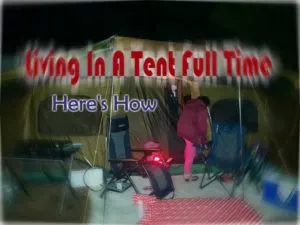
If you are looking to try out a new experience or you’re going through financial difficulties, in some cases living in a tent full-time can make a lot of sense. But it’s certainly not a matter of throwing a tent on your back and heading out the door.
A lot of preparation and research is involved. With these full time camping tips and tricks you can get a head start with the preparation and research. The key is to be fully aware of any potential hazards or misfortunes that could go wrong before you even leave the house life style.
When it comes to a tent-living experience, in order to ensure it is stress-free and easy as possible, you first need to choose a good location and choose the best tent for full time camping.
Once you have the tent set-up you will want to think about the right gear to fill the tent with such as toiletries, cooking supplies and sleeping stuff. Once you have all these items checked off your list you can start to think about ways to keep the tent safe and clean.
Below is a guide on how to get started. This will cover the pros and cons of living in a tent, the equipment you should think of bringing as well as ways to save money when living out of your tent full time.
The Best Tent For Full Time Camping

The best tent for full time camping will depend on your style of camping. Most likely you will want the more durable options which include canvas tents. The canvas material will keep the inside of the tent dry when it rains and cooler when its hot as this type of fabric is more breathable.
A canvas tent will last longer and not deteriorate in the sun as much as a nylon tent. Canvas tents when looked after can last 10+ years. Compared to a nylon which would be lucky to survive 4 years. Especially when it comes to day in day out exposure to the sun. If you do opt for a cheaper nylon tent, be sure to frequently hit it with UV Solar guard. This will help to protect the thin material from the scorching sun.
The Best Canvas Tent For Camping Permanently
The Kodiak and the Springbar. Springbar have been around longer but are more expensive. Kodiak have at least 10 years under their belt making canvas tents and are slightly more affordable.
In terms of quality, they are both on a level playing field. I’d even sway more towards the Kodiak for the thicker tent flooring. This is especially important for full time camping as the floor MUST be resilient and durable to withstand daily use.
The Kodiak tents range in size from 1 person swags to 8 person tents. For full time camping, I would certainly go for the 8 person Kodiak tent as it allows you greater moving space and areas to store your belongings.
The canvas material is 100% cotton duck canvas which is rather light considering its a thicker heavier material than nylon. Plus it’s watertight and keeps you warm in winter due to the Hydra Shield technology.
Walking around inside the Kodiak 8 man tent is easy also. The 6’6″ high ceilings ensure most people wont need to duck their heads inside the tent. Which is a treat when you are living out of a tent.
The poles for the Kodiak are steel which does mean they are slightly heavier. But this also gives you the confidence to live inside your tent whether it’s raining, storming or blowing high winds. The steel poles are more heavy duty and will do a better job long term.
Overall, if I was to pack up tomorrow and go live in a tent forever, it’s the Kodiak 8 person tent I would be calling home. It’s a great reliable and strong tent. Just what you need from a live in tent.

Living In A Tent To Save Money
A high quality tent can last you many years with the right care and maintenance. Investing in a high quality canvas tent for full time living is far cheaper than renting or paying off a mortgage month to month.
Sure you don’t have the ‘house’ after 40 years of paying off the house, but with the amount of interest you didn’t have to pay the banks, you may even have enough to buy a house outright when all is said and done. Living in a tent to save money is certainly possible.
But living in a tent for the rest of your life is certainly a sacrifice on quality of living in many regards. Which is why you must buy the best tent possible. Otherwise you’re going to hate it after a month or two and, regret the decision to go full time tent living. So don’t skimp on the tent. Invest heavily into your shelter and safety from the elements.
Can’t Afford A Canvas Tent?
However, if you are on a tight budget, then the nylon tents that come with a rain-fly are another good option when it comes to keeping you and your belongings dry, when it does rain. Because it will bucket down more than you realize.
One of the best nylon tents, which is fully covered with a rain fly, is the NTK Arizona 9 person tent. This tent is also a two room rent, so you can keep your luggage separate form your sleeping area. This is highly recommended when sleeping in a tent everyday.
If you have decided on a nylon tent you may want to consider using a waterproof treatment on the outside before you decide to use it. This will ensure your tent stays watertight for longer. I would also recommend doing this every 6 months as nylon tents do lose their waterproof attributes over time. It’s a cheap and relatively simple task to do as well.
Choose A Tent That Is Large Enough To Move Around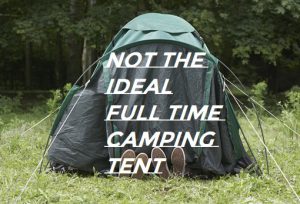
For full-time tent living you need a tent that is large enough for 3 people or more. You may even want to consider a 6 to 7-man tent if you have plans to live in the tent for a long time. Even bigger if you are sharing with another person.
A second tent is also a good option. Especially if you opt for a smaller living tent. The second tent can be for your food portions, gear, clothes etc. While your main tent is your bedroom essentially.
It is much easier to live in your tent if the structure stays in one place. However, this may not always be possible. If you have plans to move from one to location on a frequent basis, the pop-up tents are much easier to set-up as well as disassemble.
However, if you plan to stay at locations for longer than a few days at a time, then take the extra protection a tent like the Kodiak Canvas offers. While it may take 5 minutes longer to set up, your almost guaranteed to have a better experience.
Obtaining Hot Water When Living In A Tent Permanently 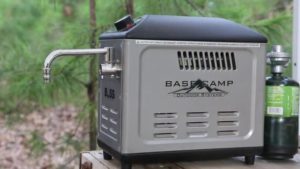
There are a few options for heating hot water when tent living all with their own pros and cons. This largely depends on whether or not you will have access to propane gas. How off the grid are you going to be living?.
Of course you can build a camp fire and boil a pot of water or 2 for hot water to clean dishes etc. But when it comes to hygiene, a hot shower works best. Without a proper shower, your personal hygiene could get out of hand some might say.
While you can access showers at camp sites and some beaches, not all of them are heated. If a hot shower is a must for you like it is for me, then you need to think about your options. Below you can find links to relevant solutions to getting hot water when camping.
- Battery powered disposable propane canister water heaters. – Requires no hose tap to work.
- Battery powered any size propane gas bottle which requires a tap to source water.
- Solar powered hot water heater for off the grid living.
How To Live In A Tent Long Term
Location Location Location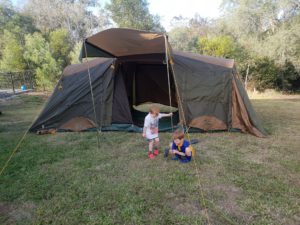
learning how to live in a tent long term begins with planning your locations. Do you plan to camp in one position for long term, or are you prepared to let destiny take you to many places over short periods?. These are questions you need to work out before you take on full time camping.
If possible, you may want to ask a family member or friend if you are able to use their yard to camp out in. This is the ideal option if you only have temporary plans to live in a tent. Another option may be asking a local farmer is you can camp on their land. In exchange for a place to stay ask the farmer if you can work on the farm.
The more popular option would be to use one of the free camping sites. You can find any nearby sites online. On a campsite you can benefit from a cleared-out and flat location for your tent and in most cases a fire-pit. Some of the free camping sites will even feature communal bathrooms that you can use. Make sure you find out from the owner of the site if they require reservations.
Check Camp Site Stay Duration Periods
Before choosing a camp site you should also find out about the duration that you will be allowed to stay before you need to move on. The majority of the dispersed campsites will have a limitation on the duration of a stay. These limitations can range anything from a week onto several weeks.
National forests will generally allow you to camp for 2 weeks before moving on. This is to preserve the nature and reduce the impact on that particular area. While you may not get ‘caught’ every 2 weeks, it’s a good idea to help keep the area beautiful. On the occasion a ranger does tell you to move on, they are generally happy to share their local knowledge of other areas you can camp.
See What It’s Like To Live In a Tent
Cooking Food While Camping 24/7
Cooking has to be one of the biggest drawbacks to living out of a tent. The freedom of a kitchen no longer exists. Having a pantry full of dry goods is no longer entirely possible. Not to mention a big refrigerator and freezer.
Fishing can be one way to obtain fresh meat on a daily basis. Another option is solar power coolers to store meat and chilled goods. Stock up on non refrigerated foods so that regardless of how much fresh meat, you can still obtain the proteins and nutrients needed on a daily basis.
Cooking Options
When living in a tent, you’re going to have to get use to cooking differently. For some people this is a welcome change, back to basics. For others, it is going to be a challenge.
The ideal set up is to use a tent stove oven. With a set up like this you can cook from inside your tent, while also using the stove as a heater during the colder months. But you can use a tent stove in any ole tent. It has to be a tent which is enabled for stove cooking. It needs to have a stove jack, flue, chimney etc. Otherwise the fumes put out from the stove can actually kill you. Take this very seriously.
Portable gas burners are another option you could utilize. But don’t do this inside your tent. Ideally you want an outdoors area with a tarp over top or a tent with a awning. Some tents have a screen room in which you could convert into your camp kitchen.
No doubt you will be setting up many camp fires. But not just for warmth, with the addition of a cast iron camp dutch oven you can make a huge amount of meals. The dutch oven can easily become your preferred method of cooking once you learn how to make bacon and eggs using one.
Positioning Your Tent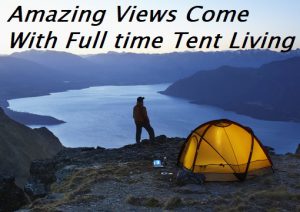
Once you have found a place where you can safely stay for as long as needed, it time to set up your tent. The tent should be positioned on flat and high ground. You want to avoid setting up your tent on a slope or incline as the tent might flood when it rains. You should also clear away any branches or rocks where you would like the tent to go.
Padding or a carpet inside the tent will offer a way to sleep more comfortably and will also offer insulation from the ground especially in the colder months of winter. If you are unable to afford padding or a carpet, you can also choose to use a comforter or a thick duvet or blanket.
A tarp footprint underneath your tent is also recommended. What this will do is protect the base of the tarp from getting any holes and tears from rocks or twigs. When choosing a tarp or tent footprint, it’s very important the tarp is smaller than the tent. This will ensure you are creating an area for water to pool around the base of your tent when it rains.
To ensure your full-time tent camping is comfortable you need to keep your belongings well organized. Life inside a tent will be a lot more manageable when everything has a place. For example, when you wake up in the morning roll up your blankets and sleeping bag so that you have more space during the day in your tent.
Setting Up A Fire Pit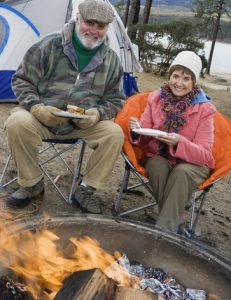
You should have a fire-pit set up close to your tent for a convenient place to dry clothes, and to cook your food as well as to provide warmth when it is really cold. Your pit should be at least 6 inches-deep and 2-feet across. Pile up rocks and dirt around the perimeter of the pit to ensure safety.
A fire pit or campfire can be a great way to have hot fresh camp coffee in the morning or evening. There are numerous ways to make coffee when camping, but utilizing the fire is a great method.
The Type Of Camping Beds Options
If you’re going to be sleeping 8 hours a night inside a tent full time, it’s very important you sleep comfortably. Life will be a serious drag if you wake up in pain every morning due to an uncomfortable bed.
There are two main options that I recommend when living in a tent. They are a comfortable camping cot or a durable everyday use airbed. In particular, a airbed which is on a bed frame. This allows you to have additional storage underneath the bed while offering you the same amount of support a regular bed would offer.
Of course you can use a regular mattress inside the ten. But if you are packing up and moving location often, a regular mattress can be too bulky to transport around. But with an airbed with a frame, the bed can fold down into a compact size.
Self Inflating Bed On A Cot Option
A camping cot is a excellent idea for full time campers. They are stable, reliable and very portable. However, they can become uncomfortable after repetitive use. So what I like to do is add a self inflating air mattress on top of the canvas cot.
A self inflating pad doesn’t require any source of pump. So no need to rely on batteries or a power source. Once you open the valve on the pad, the foam inside the pad automatically inflates as it absorbs oxygen. Which leaves you with a nice 4 inch thick comfortable foam sleeping pad. Attach this to the top of a regular camping cot and you got a very comfortable yet portable camping bed.
Protect Your Tent Home From Insects & Bugs
Most tents come with no-see-um netting to keep mosquitoes and those tiny little bugs at bay. However, as you will be living in your tent full time there is a greater chance of the bugs getting inside and driving you crazy.
So you will need to make your camp site mosquito proof using additional products. Especially if your are camping anywhere near water. Mosquitoes love the water and will breed like crazy there.
Money Saving Ideas When Camping In A Tent Permanently
Living in a tent permanently, while cheap in some areas, can be extremely more expensive when compared to living in a regular house. For example, if you use a laundromat to wash your clothes, it is far more expensive than it would be living at home.
So try and organize a way to wash clothes on the cheap when camping in your tent. You could hand wash your day to day clothes and use a laundromat for ‘important clothing’. Or plan to camp with nearby relatives or friends in which you could use their washing machines.
Taking Showers When Living In A Tent
Having daily showers can be tricky if you are living in your tent which is not on a paid camp site. You won’t have access to a public shower as readily.
Again you can use the relative/friend route if possible. Other ways of having a shower daily can include:
- Using beach facilities. If there’s a beach nearby, go for a swim. Many beaches have showers in their toilet blocks in which you can utilize. But make sure it’s between their opening hours.
- Use your local gym membership as a means to take daily showers.
- Build you own deluxe shower for camping as seen on deluxecamping.com
Protect Your Valuables
While most campers are pretty trustworthy and honest, there’s always going to be one bad apple. Especially if you are camping in a public area with a multitude of people. This increases the chances of one bad apple being in the crowd.
So in order to protect your valuables it’s worth using a little common sense. Such as when you are heading out for the day, don’t leave your gear exposed and all over the ground. This is more of a temptation compared to entering a tent that’s zippered up.
If you store gear in your car, try to block out the windows with cardboard or newspapers. Keep your tent windows down and zippered if possible. Another option is to invest in a small toolbox for storing valuables. This toolbox can be stored outdoors near your tent. To better ensure protection you can buy some long cables and lock it around a really tall tree.
How To Collect Water While Living In Your Tent
The 50 gallon Etna portable rain barrel on amazon is an affordable option that can provide enough for you to get by for a long time. The opening is zippered up with a mesh intake valve to collect the rain water. This keeps out and nasty bugs and such.
From there you can attach a hose to the tap located of the bottom of the barrel. You can go the extra mile and set up a filtration system or just boil your water for consumption.
Share Your Full Time Tent Living Lifestyle With Us
So that’s just a few tips and tricks to living in your tent full time. There’s countless other ideas that you can inherit. Each person will have their own demands like internet accessibility, solar power and location specific sites for school or work purposes.
We would love to hear your experience and adventures from living out of your tent. How did you find it?. How long did it last?. Would you ever do it again?. Please comment below and help educate other campers going on their first tent living mission.

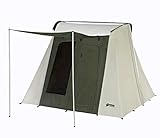

Scott Hinkle
Thursday 25th of October 2018
What an interesting article. I've never considered full-time camping before. I used to travel for 6 months out of the year in my RV over the course of about 6 years but never just in a tent. I have to admit not having a kitchen would be tough and the lack of security in a tent vs a locked vehicle or house would have me worried about my belongings a lot (I'm an IT guy so I have computers and what not who's batteries wouldn't fair too well in a hot closed vehicle).
It's actually been a while since I've been tent camping. I totally agree with the larger the better stance on tent size. My husband loves to cook which is why the kitchen for us is a necessity (not to mention the number of dishes he makes that need to be washed).
Do you have a list or site to reference for various free camping sites and stay duration limits? I could totally see that being a popular destination for those who camp a lot.
What are your thoughts of camping beds vs sleeping in the car, or bed of a truck? I'm just wondering what the options are for long-term camping and the pros and cons of each.
Thanks again for your great post.
admin
Friday 26th of October 2018
I can understand your fear of security Scott. Unfortunately you can never fully escape the nasty people of the world. However I've never come across any serious security issues when camping.
You can actually get airbeds for your car or truck if you do want to make sleeping in your car more comfortable. You can even get tents that attach to a SUV for vehicle camping full time. You can detach the tent whenever you want to go for a drive and come back to camp site at another time. Alternatively you can buy rooftop tents which sit on top of your Jeep, SUV etc.
Joey Alnutt
Thursday 25th of October 2018
These are some fantastic tips!! I used to camp a ton back when I was a child, we would often go on 2-3 week camping trips as a family, and we would always stay in a tent. Great times.
Much like Chris mentioned, I never liked bugs in my tent, or the idea that they could be crawling on me in my sleep. Im glad you dedicated a whole section for that in your article, and what you say makes sense, most times that I've gone camping I've been very close to water, and the mosquitos could be HORRIBLE sometimes!
admin
Friday 26th of October 2018
Yes Mosquitoes can certainly ruin a camping experience if they get out of control. If you're going to be camping in a tent for a long time, you MUST have the best protection against these little critters.
Jenny
Thursday 25th of October 2018
I stayed in a tent with a couple of friends last summer and it was incredible. First, we saved a ton of money. Second, we had a lot of fun - it was like we were little kids again - and third, we could move it around, so we stayed in different places. So we were on vacation for 3 months with the same money that we would stay in a hotel for a week!
The only problem was the hot water. It was warm enough during the day, but at night, we did have a problem. I'll definitely take care of that next time. Setting up a fire pit sounds nice, but we didn't try it last time. Thanks for the tip!
admin
Friday 26th of October 2018
Wow cool Jenny, that's awesome you were able to save money while camping in a tent for 3 months. Would you do it again anytime soon?
Jurgen
Thursday 25th of October 2018
Hey man, thanks for the cool tips! Me and a buddy are about to take off for a one week camping trip in the woods and although we already have a tent, it is our first longer trip out there. I thought we got all our bases covered for heating up food and coffee, but weird enough we didn't think about hot water, but yeah, that's pretty essential I guess, since we have no access to shower facilities. Guess we'll order one of those propane gas water heaters.
You're a life saver!
admin
Friday 26th of October 2018
No problem Jurgen, aren't you glad you took the extra step to do some research before heading out. Hope you enjoy your trip.
Renton
Tuesday 23rd of October 2018
This idea seems pretty far out there (pardon the pun), but upon loser inspection it doesn't seem that crazy. If you fail you will still probably acquire survival skills that you never had before and a new found respect for yourself. I think that this sort of change definitely needs a lot of contemplation and preparation because if you mess up you could actually die.
I think if you do it right though, living in a tent full time could actually be a lot less trouble - financially at least - reducing your cost of living. You would probably also learn how to use natural energy like solar to fulfill most of your energy demands. With modern technology you could even stay in the loop with tablets or phones rather than TVs which is also nice..
admin
Wednesday 24th of October 2018
Absolutely Renton, if you can camp for a week and not go crazy, why not camp full time?. The hardest part is breaking the technology cycle and reliance on modern products. But like anything, this can be done and just takes some time, patience and the will to do so.